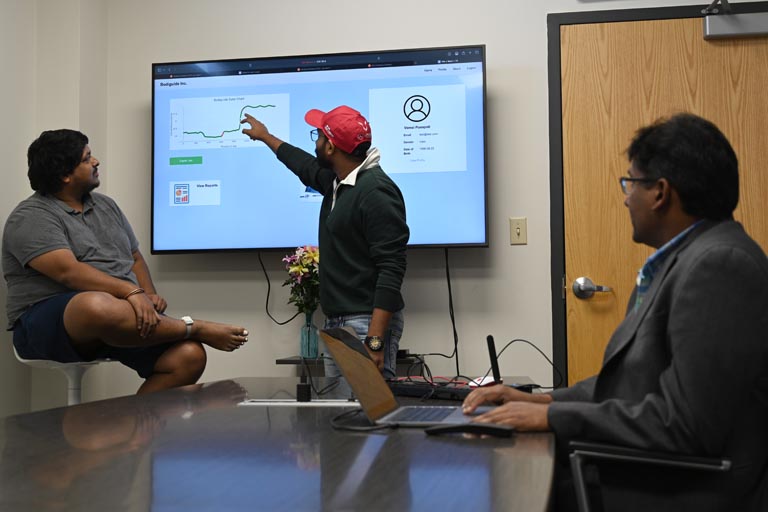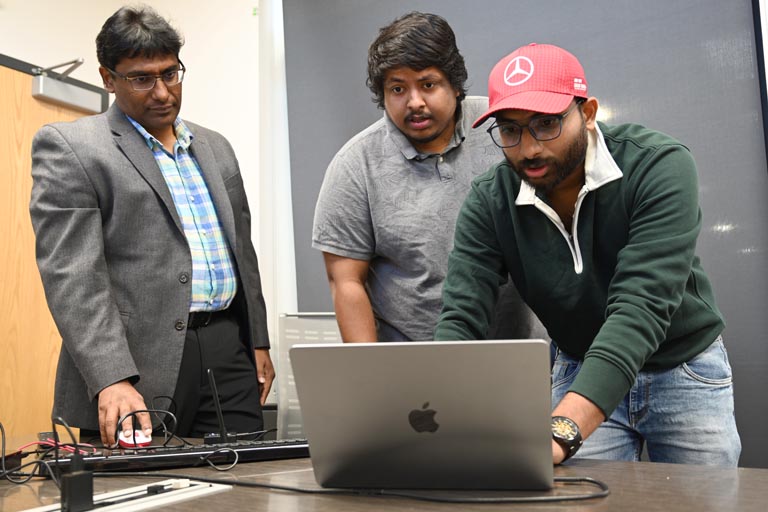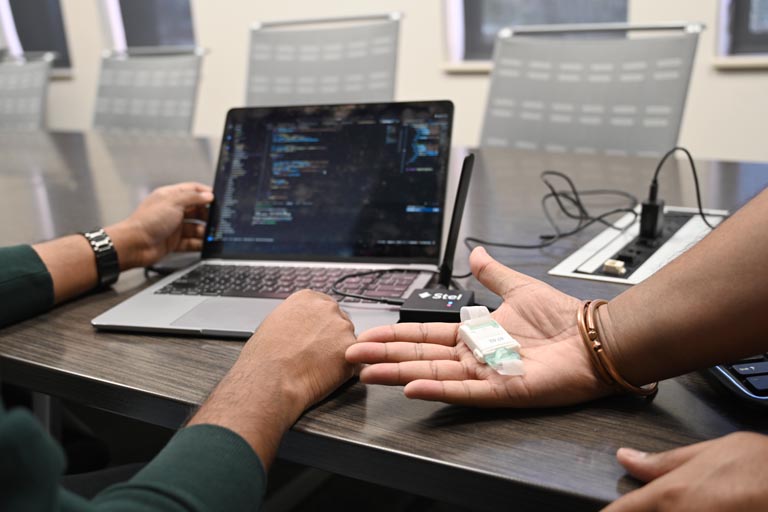October 08, 2024
Mizzou Engineers are enhancing healthcare data security using anklet sensors and cloud computing technology.

Researchers at Mizzou Engineering have come up with an innovative way to boost the security and scalability of healthcare data management for remote patient monitoring.
Their project, titled, “Zeus: IoT-based Healthcare Data Management Security Framework,” was recently accepted for publication in the ACM HealthSec Workshop, held in conjunction with the 31st ACM Conference on Computer and Communications Security. The project focuses on addressing the growing concerns of data privacy, security and system scalability in an era where Internet of Things (IoT) devices are becoming increasingly integrated into healthcare settings.
The work, led by Curators’ Distinguished Professor Prasad Calyam, is supported by the NSF I/UCRC Center to Stream Healthcare in Place (C2SHIP) at Mizzou and a recent grant from the University of Arizona. The Mizzou team collaborated with an industry partner, BodiGuide, which developed a fluid monitor that tracks a patient fluid volume to manage chronic disease including heart failure, kidney failure, lymphedema, venous insufficiency, preeclampsia and others.

The challenge of remote patient monitoring
As practitioners move toward more personalized healthcare, remote patient monitoring is becoming a key tool, especially for managing chronic conditions like heart failure, hypertension and diabetes. Patients wear IoT-based sensors that track important health data, such as blood pressure and fluid levels, which are then sent to the cloud for analysis by each patient’s medical team.
While this technology offers great benefits, it also brings challenges, like keeping sensitive data secure and building systems that can scale as demand grows. With the rapid rise of IoT sensors and more sophisticated cyber-attacks, there’s a growing need for strong security systems that can protect patient data and serve large populations.
“Our framework was designed with these challenges in mind,” Calyam said. “It combines smart sensors with cloud technology, making it easy to securely process, store and visualize patient data.”
The project uses BodiGuide’s anklet to monitor peripheral edema, the primary biomarker in the management of patients with heart failure. The anklet gathers real-time health data and transmits it to a cloud-based storage platform, such as Amazon Web Services (AWS). From there, the data is processed and presented through a user-friendly interface accessible to patients, caregivers and healthcare professionals.
“What makes Zeus stand out from other healthcare data systems is its focus on complete security guided by a rigorous threat risk assessment methodology,” Calyam said. “Instead of only protecting certain parts, Zeus has strong safeguards in place at every step to mitigate threat risk —from collecting data to analyzing and displaying it. This security keeps the system safe from data breaches, unauthorized access and tampering, all while following healthcare laws like HIPAA.”

Scalability for the future of healthcare
Zeus isn’t just about security—it’s built to scale as the demand for remote patient monitoring and personalized healthcare grows.
The system is capable of handling large volumes of data from multiple IoT sensors, even during peak times. Going forward, the team plans to test scalability and optimize the user interface experience. They also aim to incorporate machine learning into the system, allowing it to spot trends in real-time and alert caregivers to potential issues, such as needed medication adjustments or changes in therapy.
“We’re focused on ensuring that Zeus can support increasing numbers of patients and healthcare providers without compromising performance,” Calyam said. “By combining advanced technologies like ankle-worn sensors, cloud-based platforms and AI, Zeus is set to transform how chronic conditions are monitored and managed, providing a secure, scalable solution that benefits both patients and healthcare professionals.”
Calyam’s collaboration with BodiGuide and C2SHIP is also providing several opportunities for student training in sensor-based healthcare, cloud computing, security and privacy and entrepreneurship. The students involved in the project are: Mauro Lemus Alarcon (Ph.D. student), Sai Shreya Nuguri (Ph.D. student), Vamsi Pusapati (M.S. student), Karan Karthik (M.S. student), Anirudh Kambhampati (M.S. student), Chandra Bhamidipati (M.S. student), Aneesh Calyam (High School Student, Columbia, MO), Rehneet Sarang (High School Student, Columbus, OH) and Mahesh Duvvuri (High School Student, Indianapolis, IN).
Discover how to use data security to improve personalized healthcare. Learn more about EECS at Mizzou.